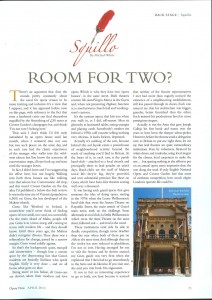An interesting article, depicting certain aspects of life in Victoria and on Gozo.
BACK STAGE Squillo
By Michael White
ROOM FOR TWO?
here’s an argument that does the rounds pretty constantly about the need for opera venues to be more inviting and inclusive. It’s a view that I support, and it has appeared before now on this page, with reference to the fact that even a hardened critic can find themselves engulfed by the flourishing of £50 notes at Covent Garden’s champagne bar and think: ‘I’m not sure I belong here.’
That said, I don’t think I’d felt truly intimidated by an opera house until last month, when I ventured into not one but two such places on the same day, and in each case had the classic experience of the stranger who walks into the wild- west saloon bar. You know the scenario: all conversation stops, all eyes look up and stare until the stranger leaves.
In fact, I didn’t leave and I’m exaggerating for effect here, but not hugely. Walking into both these houses was like walking into that saloon bar. Conversation did stop; and this wasn’t Covent Garden on the day after I’d published a below-the-belt review. It was in the tiny city of Victoria (population: 6,500) on Gozo, the less developed of the Maltese islands.
Gozo, like Wexford in Ireland, is somewhere you’d never think of finding opera: it’s too small, too rural, too unworldly. On the main island of Malta, people tell you Gozo is in a time-warp, still coming to terms with modern life – and they should know. Until three years ago, the Maltese didn’t recognise divorce. Then there was a referendum for change, passed by a narrow margin. Gozo voted solidly against.
So that’s the background: quiet, tranquil and conservative – though lent a certain spice by the disorienting fact that Gozo’s residents are basically Sicilians who speak English. Sicily is very close and we all know what goes on there.
Being more or less Italian, all Gozo-ans are devout, adore their mothers and love
Opera Now APRIL 2014
opera. Which is why they have two ‘opera houses’, in the same street. Both theatres contain life-sized Virgin Marys in the foyers and, when not presenting Pagliacci, function as a cross between church hall and working- men’s canteen.
It’s the canteen aspect that hits you when you walk in, as I did, off-season. Men sit gloomily at laminated tables, eating sausages and playing cards. Somebody’s mother sits behind a 1950s café counter selling nothing very obvious. It looks forlorn, depressed. Actually it’s nothing of the sort, because behind this sad façade exists a powerhouse of neighbourhood activity beyond the reach of anything you’d find in Britain. At the heart of it, in each case, is the parish band-club attached to a local church and principally there to lead parades on saint’s days. Band-clubs are the stuff of Maltese social life: they’re big, they’re powerful, and own substantial premises like these on Gozo, which have barn-like theatres seating well over a thousand.
It was having such grand spaces that gave someone the idea of doing opera, starting in the 1970s when the Leone Philharmonic band-club that owns the Aurora Theatre on Republic Street, the main stretch of Gozo’s main town, took on the challenge. Soon afterwards its rival club, La Stella Philharmonic which owns the Astra Theatre on the same street, followed suit- and rival is the word.
These institutions exist side by side in deadly competition, though never deadlier than the year when both of them put on Aida at the same time. And although they say the rivalry has now reduced to playfulness, I’m not so sure. Having arranged for me to visit the Aurora and be shown around, my Gozo guide was very firm when she explained that I then had to go immediately to the Astra and do likewise. If you visit one, she said, you visit both. No arguments.
It was in fact an interesting experience to go to both, not least because it seemed
that neither of the theatre representatives I met had more than vaguely noticed the existence of a neighbouring establishment, still less passed through its doors. Each one assured me that his auditorium was bigger, grander, better furnished than the other. Each insisted his productions hired in more prestigious singers.
Actually it was the Astra that gave Joseph Calleja his first break and seems over the years to have been the sharper talent-picker. However, before the Aurora sends a delegation over to Britain to put me right there, let me say that both theatres are quite extraordinary institutions. Run by volunteers, financed by whist-drives and tombolas, using local singers for the chorus, local carpenters to make the
sets…
but sparing nothing in the effort to put on an annual opera more impressive than the one along the road. If only English National Opera and Covent Garden had that sense of cutthroat competition, how much edgier London’s operatic life could be.
Arch rival: the Astra Theatre on Gozo
SOC FILAR LA STELLA
TEATRU ASTRA









